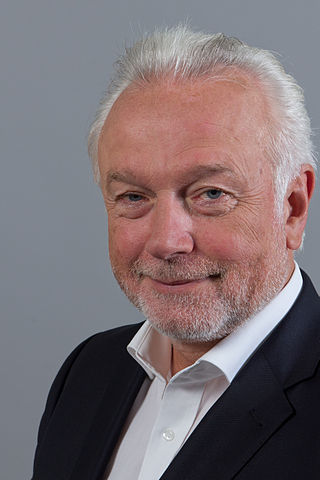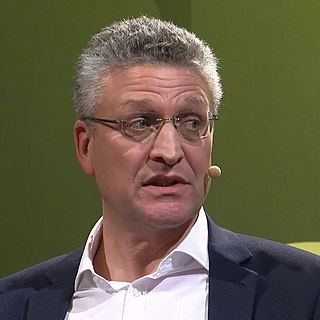
Karl Wilhelm Lauterbach is a German scientist, physician, and politician of the Social Democratic Party of Germany (SPD), who has served as Federal Minister of Health since 8 December 2021. He is professor of health economics and epidemiology at the University of Cologne. Since the 2005 German federal election, he has been a member of the Bundestag.

The Robert Koch Institute (RKI) is a German federal government agency and research institute responsible for disease control and prevention. It is located in Berlin and Wernigerode. As an upper federal agency, it is subordinate to the Federal Ministry of Health. It was founded in 1891 and is named for its founding director, the founder of modern bacteriology and Nobel laureate Robert Koch.
Wolfgang Wodarg is a German physician and politician. He was a member of the Bundestag for the SPD from 1994 to 2009.

Wolfgang Kubicki is a German politician of the Free Democratic Party of Germany (FDP) and member of the Bundestag from 1990 until 1992 and 2017 onwards. He has been vice chairman of the FDP in Germany since December 2013. Since 24 October 2017 he has served as Vice President of the Bundestag. From 1992 to 1993 and from 1996 to 2017 he served as chairman of the FDP-group in the Schleswig-Holstein state parliament..

The COVID-19 pandemic in Germany has resulted in 38,437,756 confirmed cases of COVID-19 and 174,979 deaths.
The COVID-19 pandemic in Switzerland is part of the worldwide pandemic of coronavirus disease 2019 caused by severe acute respiratory syndrome coronavirus 2. The virus was confirmed to have spread to Switzerland on 25 February 2020 when the first case of COVID-19 was confirmed following a COVID-19 pandemic in Italy. A 70-year-old man in the Italian-speaking canton of Ticino which borders Italy, tested positive for SARS-CoV-2. The man had previously visited Milan. Afterwards, multiple cases related to the Italy clusters were discovered in multiple cantons, including Basel-City, Zürich, and Graubünden. Multiple isolated cases not related to the Italy clusters were also subsequently confirmed.
This article outlines the COVID-19 pandemic in the German federal state of North Rhine-Westphalia. As of April, there have been 19,384 confirmed cases, including 446 deaths.

Christian Heinrich Maria Drosten is a German virologist whose research focus is on novel viruses (emergent viruses). During the COVID-19 pandemic, Drosten came to national prominence as an expert on the implications and actions required to combat the illness in Germany.

Ingmar Malte Hoerr is a German biologist. He pioneered vaccinology research concerning the use of RNA and is a founder of the German biotechnology company CureVac. He created the initial technology used in RNA vaccines and has reportedly been nominated for a Nobel Prize. He is currently an Ambassador for the European Innovation Council for the years 2021–2027.
Daniel Koch is a Swiss physician and federal employee. From 2008 to 2020 he was the head of the Swiss federal section "Communicable Diseases" of the Federal Office of Public Health.

Since April 2020, when Germany's Federal Constitutional Court ruled that the governmental lockdown imposed in March to counter the COVID-19 pandemic did not allow blanket bans on rallies, numerous protests have been held in Germany against anti-pandemic regulations. The protests attracted a mix of people from varied backgrounds, including supporters of populist ideas who felt called to defend against what they saw as an arrogant central government; supporters of various conspiracy theories; and sometimes far right-wing groups. Anti-vaxxers generally also formed a major part of the protesters. Some protesters held strongly negative views towards public media, who they believed to report in an unfair manner; repeatedly, journalists covering the rallies were subjected to harassment and physical attacks. Such attacks were the main reason why Germany slipped from eleventh to 13th place in the Press Freedom Index of Reporters Without Borders, according to a report published on 20 April 2021.

Sucharit Bhakdi is a retired Thai-German microbiologist. In 2020 and 2021 Bhakdi became a prominent source of misinformation about the COVID-19 pandemic, claiming that the pandemic was "fake" and that COVID-19 vaccines were going to decimate the world's population.

The COVID-19 vaccination campaign in Germany began on 26 December 2020.
Gérard Krause is a German epidemiologist. He is currently based at the Helmholtz Centre for Infection Research (HZI) in Braunschweig.

Lothar Heinz Wieler is a German veterinarian and microbiologist who served as president of the Robert Koch Institute (RKI) from 2015 to 2023. In this capacity, he advised the German Federal and State Governments on topics of public health, especially infection hazards, and on the containment of the COVID-19 pandemic.

The government of Germany initially responded to the COVID-19 pandemic in the country with preventive measures to curb the spread of the coronavirus disease 2019 in the country. With the nationwide spread of the disease from March 2020, preventive measures were replaced by containment measures, including a lockdown from March. On 25 March, the Bundestag made the determination of an epidemic situation of national significance. This created a legal framework for the government of chancellor Angela Merkel and the heads of the 16 German states to agree on nationwide pandemic restrictions. Implementation of decisions by that panel remained a matter of individual states, however, leading to differences in anti-pandemic rules and regulations across states. The Bundesnotbremse in force from April to June 2021 sought to establish uniformity.
The 2022–2023 mpox outbreak in Germany is part of an ongoing global outbreak of human mpox caused by the West African clade of the monkeypox virus. At the beginning of September 2022, Spain, France, Germany and the United Kingdom are the countries with most cumulative cases in Europe.
Two referendums were held in Liechtenstein during 2022. The first was held on 26 June 2022, in which voters decided on an exemption for pensioners from paying the annual deductible of the national health insurance. The second was held on 18 September on COVID-19 legislation.
Thomas Michael Christian Mertens is a German virologist and former head of the Standing Committee on Vaccination (STIKO), which as part of the Robert Koch Institute advises the German government regarding vaccines, in which role he became well-known to a wider audience during the COVID-19 pandemic in Germany.










